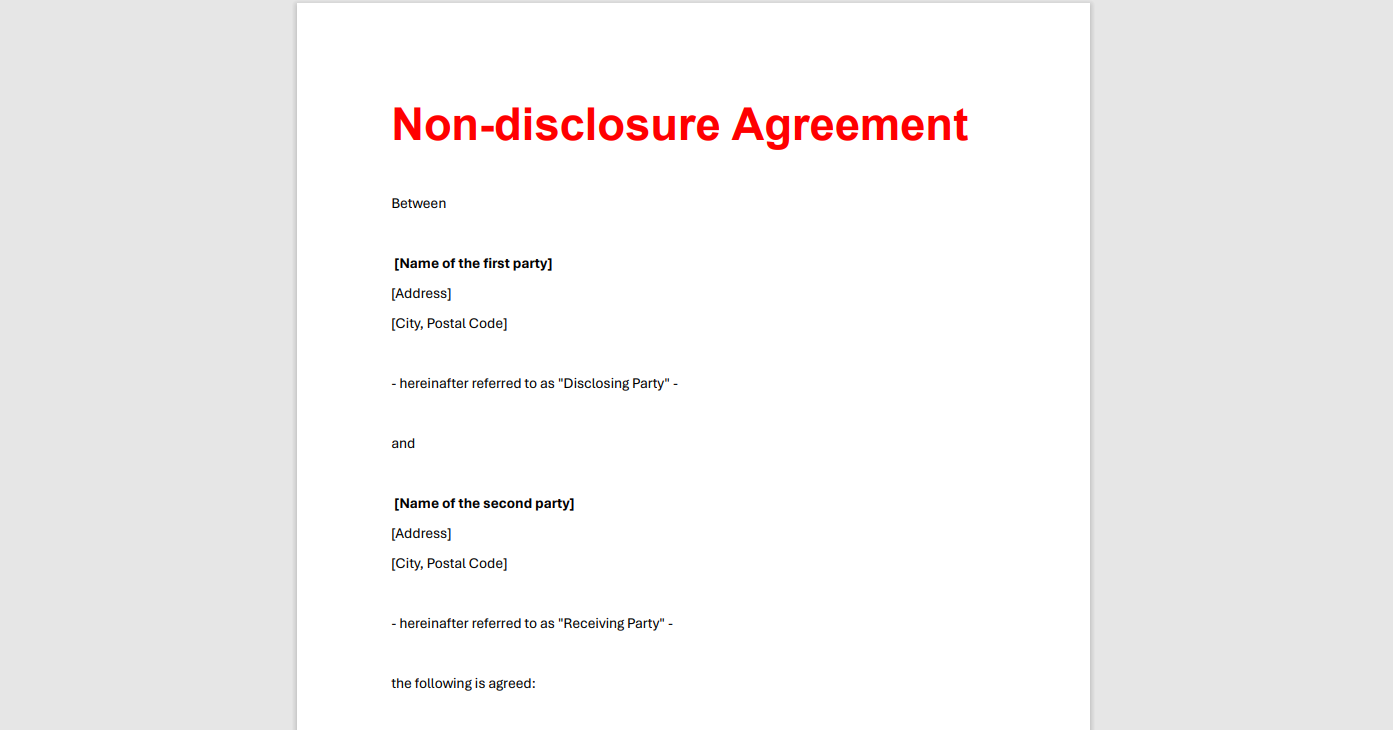In a world where trade secrets and innovation form the backbone of business success, non-disclosure agreements (NDAs), also known as confidentiality agreements, play an indispensable role. These agreements provide a solid foundation for protecting confidential information between multiple contract partners.
Explore the necessity, legal framework, and best practices of non-disclosure agreements.
What is an NDA, and Why is it Important?
A non-disclosure agreement is a legally binding contract that prevents the disclosure of confidential information between two or more parties engaging in business together. It is commonly used in negotiations or collaborations between companies. Both parties commit to maintaining confidentiality about the information declared as confidential.
An NDA ensures that sensitive data, ideas, inventions, or trade secrets do not fall into the wrong hands. These agreements are crucial for protecting the integrity and competitive advantage of companies. All parties involved are bound by the NDA they signed, and a breach can have serious legal consequences.

NDA between two parties
Areas of Application for Confidentiality Agreements
NDAs protect your company, whether in the early stages of a partnership, during the hiring of new employees, or in the development phase of a new product. They are essential in negotiations where information needs to be exchanged but there is no formal contractual basis yet. NDAs compel companies to protect intellectual property and trade secrets and ensure confidentiality when working with external service providers.
Legal Aspects of Non-Disclosure Agreements
NDAs legally bind the contracting parties to maintain confidentiality. They specify which information is considered confidential, how this information must be protected, and the consequences of breaching the agreement. A breach can lead to significant claims for damages.
The NDA should protect a company’s trade secrets and operational information, minimize potential damage from unauthorized disclosure, and even stipulate specific penalties for non-compliance, given the stakes involved in the existence of a company. An NDA must be precisely formulated to ensure legal protection.
Duration and Commitment
The duration of a non-disclosure agreement can vary. Some NDAs are valid for a specific period, while others remain in effect until the information becomes public or indefinitely. However, the obligation to maintain confidentiality typically extends beyond the term of the agreement. All parties with access to the confidential information are bound by the NDA. Sharing this information with third parties without explicit consent is typically prohibited.
Contents of an NDA
- What information is considered confidential?
- What are the exceptions to confidentiality?
- What is the duration of the confidentiality obligation?
- What are the rights and obligations of the parties involved?
- What are the consequences of breaching the agreement?
Additionally, rules on the return or destruction of confidential information after the termination of the agreement should be laid down.
Types of NDAs
There are two main types of non-disclosure agreements: unilateral and bilateral.
Unilateral NDAs protect information disclosed by one party to another, while bilateral or reciprocal NDAs protect the exchange of information between two business partners.
New Trade secrets Protection Act (“GeschGehG”)
Non-disclosure agreements are a means of making effective use of the German Trade Secrets Protection Act (GeschGehG). The law provides a clear framework for the protection of trade secrets.
If the business partners have signed the NDA, they took appropriate measures to protect the information. Secondly, there was also precisely defined which information is worthy of confidentiality. Resulting in the right for both parties to take legal action if any protected information is disclosed.
Reasonable contractual penalty
A contractual penalty is defined within the NDA. This serves more as a deterrent against breaching the agreement. The amount of the contractual penalty should be appropriate and reflect the potential damage that may result from the disclosure of confidential information. The injured contractual partner thus receives compensation in the event of a breach of contract.
Advantages and Strategic Application
The strategic use of NDAs can significantly impact business success. They provide security in the disclosure of innovations and support a trusting collaboration between the parties. Careful drafting of an NDA can substantially minimize risks and protect business interests.
Important fields of application and industries
NDAs are important in almost all industries, especially in areas such as technology, pharmaceuticals, finance, consulting and anywhere else where innovation and trade secrets play a role.
Sign in Paper Form or Digitally?
How do you sign an NDA in your day-to-day business? Many companies have switched to digital signatures, whether integrated into their software or through a web service.
In the B2B world, an advanced electronic signature is typically used, but for NDAs concerning patents or highly confidential ideas, a qualified electronic signature may also be required, where signatories must identify themselves.
Digital signatures streamline the process, avoid disruptions like printing and mailing, and provide better security than a printout, which could potentially fall into the wrong hands.
Protect the Data in Your Non-Disclosure Agreement
If you are concerned about the security of NDA documents, seek a reliable eSignature provider that professionally protects your sensitive data.
For example, Certifaction encrypts your documents on your end device and transmits your data fully end-to-end encrypted.
Not even the eSigning provider Certifaction itself has access to the documents, which means that even a potential attacker has no insight into the content of your documents. This privacy-first approach protects your most confidential information sustainably and securely.
Zero Document Knowledge with Certifaction API
Digital Twin
If you are concerned that the NDA could be changed at a later date, there is a solution for this too: the innovative Digital Twin feature protects documents from subsequent changes and makes them immediately visible in the review. Using a QR code, the document can be easily checked in printed or electronic form and compared with its original state. This makes documents completely forgery-proof.
Conclusion: The Value of NDAs
NDAs are an indispensable tool for protecting confidential information, allowing companies to share and develop their ideas and innovations securely. In an era where data is considered the new gold, NDAs provide a necessary safeguard to maintain competitive advantage and protect the integrity of business ventures.
Safeguard your company with NDAs and ensure the confidentiality of these documents with a reliable eSignature tool.
Content
- What is an NDA, and Why is it Important?
- Areas of Application for Confidentiality Agreements
- Legal Aspects of Non-Disclosure Agreements
- Duration and Commitment
- Contents of an NDA
- New Trade secrets Protection Act “GeschGehG”
- Reasonable contractual penalty
- Advantages and Strategic Application
- Sign in Paper Form or Digitally?
- Protect the Data in Your Non-Disclosure Agreement
- Conclusion: The Value of NDAs



